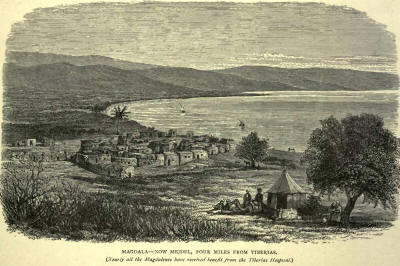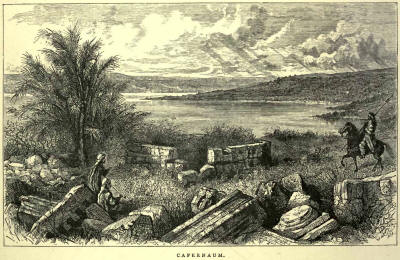|
IN February 1884, Dr.
Torrance and myself were sent to Palestine by the Jewish Committee to
discover the best sphere for a new Medical Mission to the Jews. We were
accompanied by Dr. Laidlaw, the then superintendent of the Glasgow Medical
Mission, and by Dr. Vartan of Nazareth, the representative of the Edinburgh
Medical Missionary Society. We recommended that Tiberias should be the
central station, and that a branch station should be planted somewhere among
the hills of Northern Galilee.
Though we did not know it at
the time, we were substantially repeating the recommendation made by
M'Cheyne and Andrew Bonar forty-five years before, in 1839. In their famous
"Narrative of a Mission of Inquiry to the Jews" (30th thousand, p. 284),
they say: "Thus our last evening in Saphet came to a close. We could not
help desiring that the time

would come when our beloved
church should be permitted to establish a mission here......A mission
established in Galilee would have this great advantage, that the
headquarters might be at Saphet in summer......and at Tiberias in winter,
where the cold is scarcely felt......They [the Jews] have a peculiar love
for these two places, being two of their holy cities, and many of their
saints being buried near......If the Spirit of God were poured down upon
Saphet, it would become a city that might shine over the whole Jewish
world—`a city set on a hill cannot be hid.' Such were our feelings upon the
spot in 1839."
Two scenes which I witnessed
in Palestine may give the reader some idea of the enormous power of medical
missions in that land. In March 1884, our party visited El-Bakeia, an
out-of-the-world village among the Galilean hills. It was soon "noised" that
three European doctors had come to the village. Words borrowed from the
Gospels are best fitted to describe what I then saw. "And straightway many
were gathered together, insomuch that there was no room to receive them, no,
not so much as about the door." Our parallel experience embraced minute
details. It was "at even, when the sun did set;" and "in the morning, rising
up a great while before day," we went out (Mark i. 32, 35); for our stock of

medicines was exhausted, and
we wished to escape froni the importunate sick folk. We were in an "upper
room," or "loft," or "guest chamber," in the only two-storied house in that
quarter; and the people flocked to us, not by the streets, but over the
green flat roofs. The whole village was drawn to us as by a magnet. The
"divers diseases" seemed to be the very same, and as numerous, as in
Christ's day; and the sick as earnestly besought us that we would heal them.
We could hardly find either time or room to eat our bread. F actually saw
thorn "bringing one sick of the palsy, which was borne of four" (Mark ii.
4). I felt the slender roof quivering under their tread. Had the healer been
in the lower story, they could soon have uncovered the roof and laid the
patient at the healer's feet. It would have been but the work of a few
minutes to repair the : damage. The daily life of the great Healer was at
that hour under my eyes with more than stereoscopic distinctness; and very
great was the joy of the surprise. I felt that my comrades were giving these
bigoted Galileans the only exhibition of Christ's gospel which as yet they
either care for or can comprehend. What an admirable way of ringing the
bell, and creating the welcoming mood in the hearers! What a splendid
object-lesson on the genius of the gospel!
In 1891 (when again in
Palestine on the errands of this mission), in company with Mr. Christie, our
teacher at Safed, Dr. Saadeh, our medical missionary, and his dispenser, we
made a missionary circuit through the highland villages which our Saviour
used to visit from Capernaurn. We were thus both on and in His very
footsteps, healing the sick and preaching the gospel. We came to Jish, the
Giscala of Josephus, and the home of the Zealots, so famed in the Jewish
war. We there found the past in the present, and warm with the full breath
of life ; the great gospel scenes lived before our very eyes. The Greek
church was thrown open to us, and in a few minutes the doctor had about one
hundred and fifty patients. Mr. Christie gave an Arabic Gospel to every boy
who could read. The favoured boys were greatly delighted with their prize.
Each of them gathered an admiring circle under a leafy tree, and with
wonderful animation recited the words of life, which, very probably, Christ
had spoken to their ancestors on that very spot. The joyful sound echoed
through the whole viIIage. An American in our party took me aside, and said
with emotion, "I never expected to see a sight like this on earth. I now
understand the life of Christ as I never understood it before. With an
agency like this you could soon carry the gospel to every inhabitant of
Galilee. I promise you that I shall do all I can to support such missions."
There was keen competition
for the honour of entertaining us. We spent the evening as the guests of the
sheik of Yaron, the Iron of Joshua. His salutation was, "Peace be unto you.
I give you a thousand welcomes." His grandson had been in our school at
Safed, and right glad was he to have a real healer under his roof. His
patriarchal household numbered about fifty souls, and, along with his
favourite Arab mare and one-day-old foal, were all under the same roof with
us. The doctor conducted family worship in Arabic.
The medical missionary in
Palestine to-day wields such a power as has seldom been granted to men since
the days of Christ. The natives have little faith in their own physicians.
They believe that medical science is the offspring and heritage of the
Christians, and they expect cures to come to them supernaturally through one
who is a representative of God. They believe that all the good angels
accompany the true healers, whom they call "the people of blessing." They
reverence the mysterious doctor almost as a god, and expect him to work
veritable miracles. Some even call him "the great physician," and he soon
gains a reputation wonderfully like Christ's. "His fame is spread abroad
throughout all the region round about Galilee." They pray for him while he
is applying his remedies. And lie is to them a great miracle-worker when
contrasted with their own pretenders to medicine. They appeal to him to cure
old age, and to give not eyesalve only, but eyesight to the blind, and will
not be said nay. Sometimes the dying cling to the doctor, and implore him to
save them. The belief still lingers among them that their sick are possessed
by evil spirits. As with the wise men from the east, their very superstition
may pave the way for the true faith. At least, it offers a most hopeful
point of contact to the Christian missionary. These facts show that we can
scarcely exaggerate the possibilities of a mission like ours, when wisely
conducted, and supported by the intercessions of the faithful.
Our Tiberias Mission may
easily be used as an excellent Bible Expositor and Educator, especially for
the young. It tends to give them a full persuasion of reality, and a happy
home-feeling concerning the gospel narratives; it helps wonderfully to
verify and vivify the sacred page; it brings the great Healer very near, and
sheds an incandescent light upon His daily life. Such an experience is
greatly needed among us. Lecturers on Palestine can tell the most amusing
stories about some of their hearers, otherwise intelligent, who have been
astounded to find that people could to-day visit the very places mentioned
in the Bible. They had secretly concluded that all these spots had long ago
been taken up into the floor of heaven, and that they could not see them
till after death. Their strange rediscovery of Bible sites has given some a
shock of surprise which has deeply affected their Christian life. If the
Holy Land be as a fifth gospel, an intelligent sympathy with medical
missions in Palestine should bring us something like a sixth gospel.
Our Tiberias hospital is a
wonder and a joy to the Galileans when in sickness. In contrast with their
squalid huts and tents, its sweetness and cleanness, its pervading
atmosphere of Christian love iii that loveless land, its power to bless, and
its abundance, seem to them scarcely to belong to this world. Under its roof
they feel as if they were in the Paradise of God. To them it is a real
Bethel.
Our Galilee Mission brings
now, as in the days of Christ's flesh, "the double cure" within reach of the
suffering thousands in Galilee, in Decapolis, and from beyond Jordan. We
hope that it will also, by God's blessing, revive the religion of Christ iii
its earthly cradle, which, for many centuries, has also been its grave. In
any case, our beautiful and commodious mission buildings—quite as good as
any between Dan and Beersheba—are an impressive monument to the Great
Physician. They are also a memorial of Christian faith, and a token that we
are not forgetful of our Saviour's twofold command, "Heal the sick that are
therein; and say unto them, The kingdom of God is come nigh unto you." |

